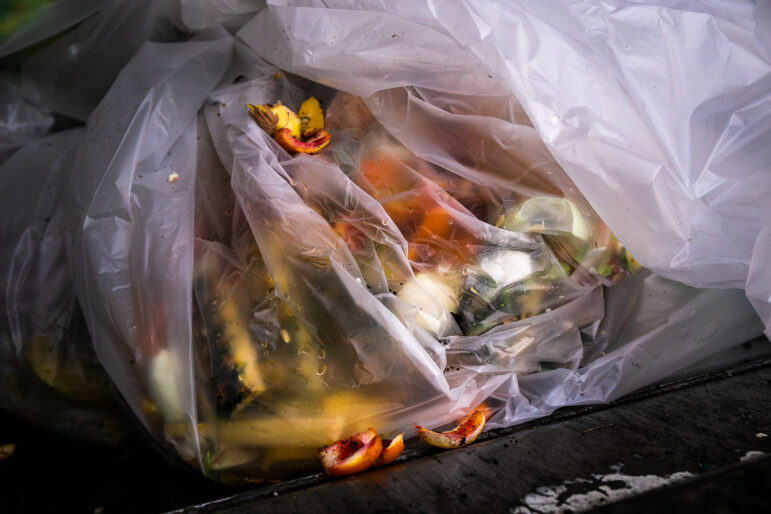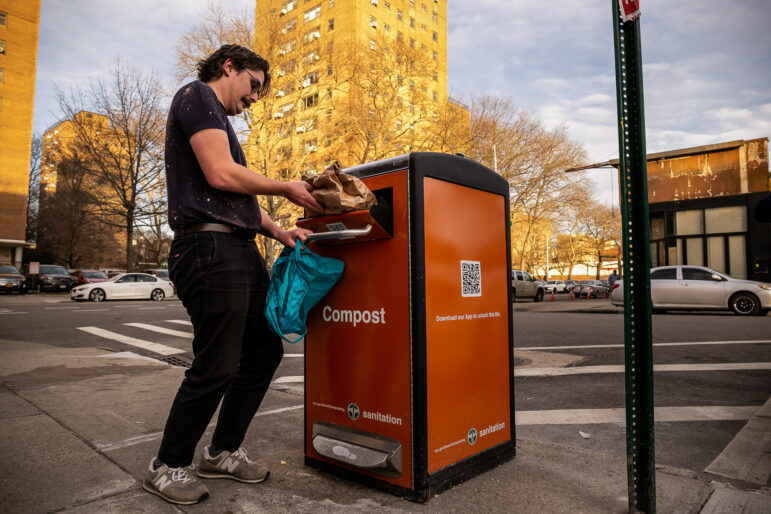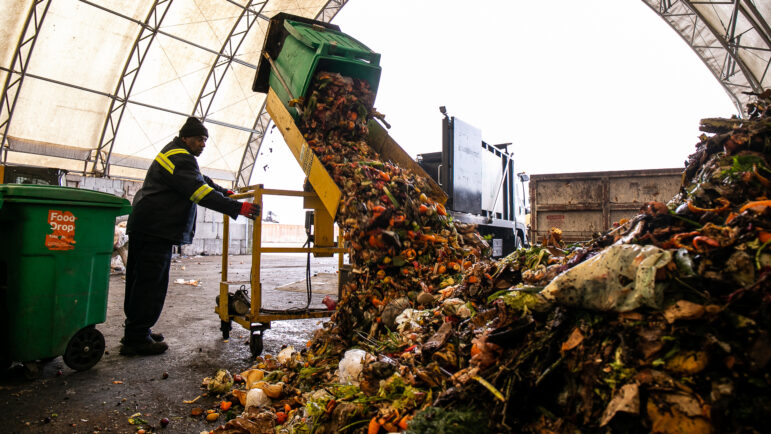The City Council on Thursday passed a “groundbreaking” legislative package that forces the city to divert food-based garbage away from landfills and reuse it instead for environmentally friendly purposes, like composting and generating cleaner energy. But there’s much more to do for the city to reach its Zero Waste goals.

Adi Talwar
Bagged food scraps in the back of a sanitation truck in Queens, February 2023.The New York City Council passed a long-awaited “Zero Waste” legislative package on Thursday, which will expand the pick-up of food-based waste citywide and require all residential buildings to participate by fall of 2024.
Instead of being dumped in a landfill, the bills mandate that organic waste be reused for environmentally friendly purposes. That includes composting, which is the process of recycling organic material to reuse it as fertilizer for soil and plants, as well as processing waste to generate alternative forms of electricity that emit less greenhouse gasses.
The carbon dioxide released from food waste represents 20 percent of New York City’s overall greenhouse gas emissions, making it the third largest contributor behind buildings (35 percent) and transportation (21 percent).
The legislation’s passage came as New York City grapples with its latest climate change crisis, with smoke from hundreds of Canadian wildfires creating hazardous air across the five boroughs this week, prompting the city to cancel outdoor events and urge residents to remain indoors.
“[As this] package passes every New Yorker is experiencing this air quality issue. So we understand the urgency and we have to be united and tell the city that they must lead on addressing environmental issues,” said Council Member Shahana Hanif, the main sponsor for one of the bills.
A long time coming
Advocates say the legislation, which had overwhelming majority of over 40 co-sponsors sign on, is the culmination of a decade-long struggle to get the city to follow through with promises to recycle food waste on a larger scale.
Back in 2013, Mayor Michael Bloomberg called for a mandatory composting program and two years later his successor Bill de Blasio launched OneNYC, a proposal to redirect all residential waste away from landfills by 2030. But New York City’s composting programs alone have never “served more than approximately 40 percent of the city,” according to the mayor’s office.
Councilmember Sandy Nurse, who chairs the Sanitation and Solid Waste Management committee, called the bills “groundbreaking.” When she first started leading efforts to expand the collection of food waste as a community organizer 12 years ago, the city was more focused on placing collection bins in “white, single family homes,” Nurse said.
When the pandemic hit in 2020, former Mayor de Blasio suspended the city’s then-voluntary composting program in a round of budget cuts, restoring it more than a year later but only in certain neighborhoods. Low participation, experts said at the time, would partially counteract the environmental benefits of the initiative, citing greenhouse gas emissions from increased truck traffic needed to collect the food waste.
Over the last two years, the city has expanded its organic waste collection efforts, creating what Mayor Eric Adams earlier has called “the nation’s largest composting program.”
It included launching a pilot curbside collection initiative in all of Queens that went live in October of last year and diverted 12.7 million pounds of food waste—an effort the administration said amounted to the “most efficient curbside composting program ever”—and adding hundreds of “smart bins” where residents can drop off their scraps directly.
“By the end of 2024, every New York City resident will have access to clean, convenient, curbside compost pickup from the Department of Sanitation,” Mayor Adams said at a press conference in February.
Now, the Zero Waste package guarantees that collection bins will be available in all neighborhoods, and requires the Department of Sanitation (DSNY) make outreach and education materials available “to inform residents” about the program and teach them “how to separate organic waste.” Residential building owners who fail to separate food matter for pick-up will “be liable for a civil penalty” or fine that is yet to be determined.

Adi Talwar
Queens resident Jack Bernatovicz using a “Smart Bin” at the corner of 34th Avenue and 24th Street in February.But the bill’s supporters warn that the success of the program hinges on making sure the requirements are properly enforced.
The legislation, and Mayor Adam’s commitment to reaching the goal of Zero Waste in landfills by 2030, could be compromised if the city doesn’t pour enough resources into educating the public on the importance of compliance, or if it fails to invest in the infrastructure needed to process diverted food waste.
“It’s really going to be a test of our commitment to real climate action. And that’s going to take all of us New Yorkers here in the city and across the state to really hold our government’s feet to the fire on it,” Nurse said.
Making it work
But the city doesn’t have the best track record when it comes to current recycling compliance. Last year, the non-profit Citizens Budget Commission said New York City’s recycling rates “continue to lag” behind other cities and that over the last decade, “the share of curbside waste that is recycled—increased just 1.6 percentage points, from 15.4 percent to 17 percent in fiscal year 2022.”
Still, city officials are hopeful when it comes to food waste. “As we expand this program across the city and continue to educate New Yorkers on the ease and importance of composting, we expect to see more and more New Yorkers participate,” a spokesperson for the Department of Sanitation said in an email.
Environmentalists warn, however, that without investing in a hefty educational program to get people on board, residents could fail to comply.
“The Department of Sanitation and advocates will have to do a lot of outreach and education, because this is a new program that a lot of people don’t know about,” said Alia Soomro, deputy director for New York City policy at the environmental group New York League of Conservation Voters.
“Even I don’t remember all the details about what food scraps have to go in [the bin]. So there would have to be a lot of outreach in different languages,” Soomro added.
But keeping people informed isn’t the only hurdle when it comes to reaching the city’s Zero Waste goals. The five boroughs are currently home to two* facilities that can process food waste for composting and anaerobic digestion, a process which breaks down organic matter to produce biogas.

Adi Talwar
Green waste being dumped from a 64 gallon toter at one of the city’s compost processing sites on Staten Island.That’s not enough to handle the additional intake of organic waste the new requirements are expected to bring, according to Councilmember Hanif, who told City Limits that “the city is not equipped” to process food scraps at a larger scale.
“Without the processing infrastructure, we are not creating compost that is usable,” Hanif said.
The Zero Waste legislative package doesn’t include the language necessary to push for the creation of more processing facilities, the councilmember points out, but said she and her colleagues intend to fight for its inclusion in the city’s Solid Waste Management Plan.
In an email, the Department of Sanitation said that it will be “re-evaluating the destination of compost material as the curbside composting program expands.”
Eric Goldstein, an environmentalist who has been pushing for the city-wide collection of organic waste for over a decade, recognizes that the Zero Waste program can’t be expected to “bring dramatic change overnight,” and hopes that whatever infrastructure needs are lacking will be addressed gradually as the program unfolds.
The important thing, Goldstein says, is that after 10 years of efforts, the city is finally putting forth laws to guarantee the collection of organic waste and yield immense environmental benefits.
When organic waste is incinerated it increases air pollution. And if food scraps are sent to a landfill, they decompose and emit methane, a potent gas that contributes to Global warming.
“Landfills are the third largest source of methane emissions in the United States,” Goldstein said. “So by getting at least a substantial portion of the organics out of incinerators and landfills, the council is striking a blow for environmental justice and to right those historic wrongs.”
*A previous version of this story incorrectly identified the number of organic waste processing sites located within the city. There are two, not four. City Limits regrets the error.









6 thoughts on “NYC Makes it Mandatory for Residential Buildings to Recycle Food Waste”
Another burden on the 565,000 owners of 1 and 2 family homes in NYC.
How in the world are we supposed to comply with this NEW MANDATE? We pay out of our noses to live in small apartments, with packed refrigerators, and hardly enough space for two garbage bins. Are we supposed to walk out after every meal and throw our food scraps in a street bin? Not happening. Address the out of control crime and violence in the streets and subways first!
In the old days, when a donut cost 25 cents, I’d bet you dollars to donuts—now with a simple donut costing $2.50-$3.00—I’ll bet you donuts to dollars that there will never be enough deposit facilities with sufficient capacity, which will result in garbage piled up next to them. A red carpet welcoming rats, roaches and all other types of vermin.
Together with hundreds of my neighbors I have been bringing all my vegetable waste for composting to the Union Square greenmarket for over 30 years. How to keep the waste until the day I bring it: Put it in empty yoghurt containers that sit next to the sink while preparing the food and keep it in the refrigerator. To bring it to the deposit site, empty the several yoghurt containers into one or more bread bags. Not hard.
“It included launching a pilot curbside collection initiative in all of Queens that went live in October of last year … .” Unfortunately, that initiative was suspended for the winter months, just as residents were getting used to participating in it. Nothing like an arbitrary suspension to cause the public to lose momentum (and to doubt the city’s seriousness regarding this environmentally responsible endeavor.) Odd how the writer left out that telling detail.
This is great but also severely late. NYC is known across the world as “trash city”. Without heavy investments in enforcement and educating communities on what does and doesn’t go in these compost bins (NOT dog poop!), we are not going to make much progress. For the people who don’t understand the importance of switching to compositing, they also need to be educated that they are contributing to an ever-warming planet.